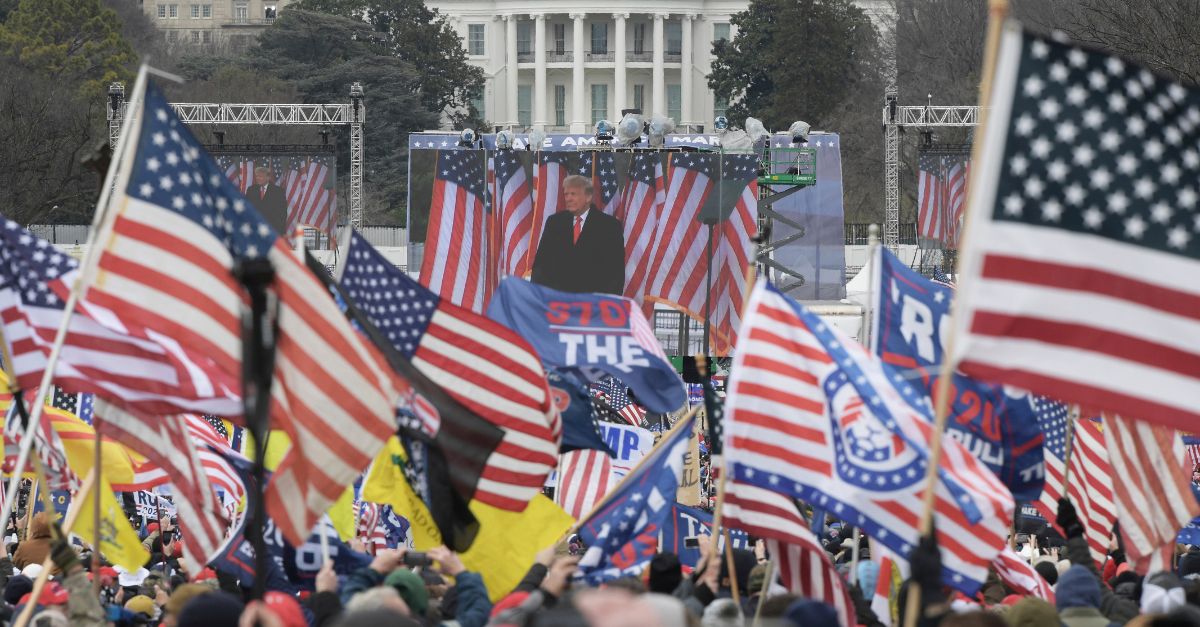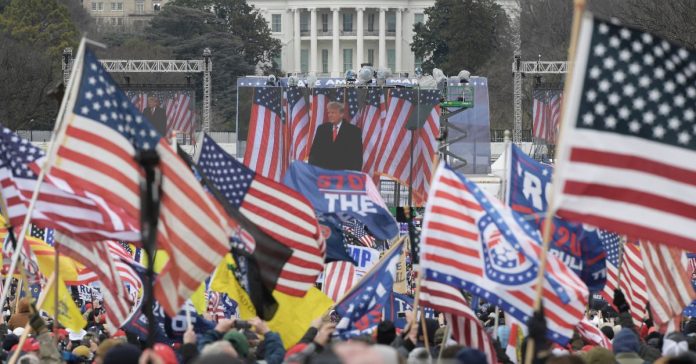
President Donald Trump delivers remarks during a rally Save America March on January 06, 2021 at White House/Ellipse in Washington DC, USA. (Photo by Lenin Nolly/Sipa USA)(Sipa via AP Images)
Very soon, a federal judge in Washington, D.C., is expected to issue a ruling that could expose key pieces of discovery that some lawyers say prove Donald Trump acted in his “private” capacity on Jan. 6, 2021 — not in his official role — when whipping up a mob of his supporters at the Ellipse and urging them to descend on the Capitol where lawmakers were meeting to certify the 2020 election.
This is a key distinction for a group of former and current U.S. lawmakers and police suing Trump for violations of the Ku Klux Klan Act, as Law&Crime previously reported. Just this week, the former president filed a motion to stay that civil litigation indefinitely, invoking his brewing immunity question before the Supreme Court.
Law&Crime spoke to Joseph Sellers, an attorney representing the lawmaker plaintiffs. The parties met this week to finish briefing the requests for discovery before U.S. District Judge Amit Mehta.
Trump argues the overlap between the civil claim and his criminal indictment prosecuted by special counsel Jack Smith is too great and that going to trial, or even beginning pretrial proceedings like discovery, would threaten his Fifth Amendment right against self-incrimination.
While there may be some overlap in the details of the respective cases, Sellers said Trump’s wait-and-see approach by invoking the immunity question doesn’t hold up.
“The criminal case that’s before the Supreme Court on the question of immunity is framed entirely differently in this respect and it’s quite important. In our civil case, the question is whether his conduct was primarily of an official or private nature. That’s pivotal,” he said.
When the Supreme Court set arguments on Trump’s immunity question, they framed the question in a way that assumes Trump’s conduct on Jan. 6 was official and as a result, the question was whether he was immune from criminal prosecution.
The private-versus-official distinction isn’t presented there, Sellers said.
Because of this, the lawmakers say that no matter what the high court does, it should have no impact on the availability of immunity in the civil case. Invoking Trump’s criminal Jan. 6 trial, which is currently in purgatory itself, is a “grossly overbroad request,” the attorney said.
The burden of proof is on Trump, he said. It come down to whether he wants to prove, though he is not required to do so, that his conduct on Jan. 6 was primarily official.
“We don’t think he can do that,” Sellers said.
The evidence of his conduct when taken as a whole on Jan. 6, the lawyer told Law&Crime, makes it clear he wasn’t acting officially:
The event at the Ellipse that preceded the crowd descending on the Capitol — all assembled and fired up by Trump — was organized by a private organization, not the official White House administration. The permit for the event was requested by a private person, not anyone in an official capacity. The funds for the event at the Ellipse came from a private source. People who appeared at the Ellipse [like Rudy Giuliani or John Eastman] all appeared, we believe, in their private capacity.
All of this paints a portrait and it is a portrait that creates the inescapable conclusion that he was acting in his private capacity.
Sellers acknowledged that while the content of what Trump said at the Ellipse is “not supposed to be dispositive,” it was still profoundly relevant.
“It’s clear the content of what he said was about seeking and securing his reelection. The courts have repeatedly confirmed that seeking your reelection is a necessarily private act. There is no ‘official’ role that can be performed for people who are campaigning for their election whether you’re incumbent or not. Either way, the campaign activity is necessarily private in nature,” Sellers said.
The plaintiffs are particularly interested in discovering Trump’s private records from X.com, formerly Twitter. Sellers said while Trump may have used the account to issue official messages, like firings or hirings, it was still a personal account. Trump wants the records shielded.
There is a chance Mehta will not grant the full stay as Trump has asked. If not, Sellers said he hopes it is at least a partial one and that they aren’t blocked out completely. Many of the documents they want are in the public record already, so Trump should have no problem complying with those requests, at minimum, he said.
If the judge rules against Trump, the plaintiffs’ yearslong wait could prove well worth it. It may be hugely beneficial for Smith to have evidence established somewhere in the great record of Trump’s legal history that he acted for himself on Jan. 6 and not for the American people.
Though he is “very mindful” the issues presented in their case have “broader public consequences,” Sellers says that has never been the goal.
“The most important feature of our case is that we instill a sense of accountability with what happened on Jan. 6,” he said.
Law&Crime takes a look at this and other developments in Trump’s cases in Florida, Georgia, Washington, D.C., and New York.
NEW YORK
CRIMINAL
Trump’s push to delay his 34-count criminal hush-money and election interference trial on grounds of “presidential immunity” was rejected on Wednesday. Trump’s ask to adjourn proceedings until the end of this summer lacked “sincerity and actual purpose” since the former president had elected not to raise his immunity defense until well past the 45-day statutory deadline, New York Supreme Court Justice Juan Merchan ruled.
Similarly, a day earlier, Manhattan District Attorney Alvin Bragg informed the court that Trump’s claims of “changed circumstances and newly discovered evidence” were nothing more than an attempt to force the recusal of the judge — again.
Trump called for Merchan’s recusal first in June 2023, arguing the judge could not be impartial since his daughter worked as a Democratic Party-affiliated consultant for Authentic Campaigns, Inc. A court ethics panel ruled Merchan could be impartial. But Trump tried taking a second bite of the apple since, according to attorney Todd Blanche, Merchan’s daughter as recently as last month used social media at her job to “market its connections” to President Joe Biden while “deriding President Trump,” he claims.
The trial is expected to begin with jury selection on April 15.
Trump has tried to shut down the trial eight times so far and according to Bragg, he should never be rewarded “perverse” attempts to stop proceedings. Merchan also rejected Trump’s last-ditch effort this week to stay the case until the U.S. Supreme Court rules on his immunity question, calling his arguments “inadequate and not convincing.”
Meanwhile, the gag order placed on the former president a week ago and then updated to cover the judge and his daughter after Trump’s attacks online, has stirred up legal troubles elsewhere. In response to Merchan’s decision, Senior U.S. District Judge Reggie Walton went on CNN last week to discuss it and declared support for it, noting the uptick in violent rhetoric and threats to judges since Jan. 6. In response this week, the head of a right-wing group filed a “judicial misconduct” complaint against Walton.
Former U.S. attorney for the Western District of Virginia John Fishwick offered analysis to Law&Crime on the gag this week, arguing it was a form of retaliation and may lead to further delays in the long-awaited trial.
Legal analyst Andrew Weissman meanwhile has said revoking bail for Trump should be considered after Trump shared a video online of a supporter’s pickup truck displaying an image of a hogtied President Joe Biden on its tailgate.
Notably, two days before the gag was ordered, a man in New York was arrested for allegedly sending death threats via voicemail and text to New York Supreme Court Justice Arthur Engoron, the judge who oversaw Trump’s civil fraud case, as well as New York Attorney General Letitia James.
OF NOTE: Merchan on Friday denied Trump’s bid to subpoena records from NBCUniversal related to a documentary produced by the media outlet involving Stormy Daniels, a witness in the former president’s pending hush money and election interference trial.
CIVIL
As Trump appeals, the saga over his bond in his civil fraud judgment continues. He posted a $175 million bond with the help of Knight Specialty Insurance of California in order to stave off New York Attorney General Letitia James from seizing his assets. The court agreed to let him post just a portion of the $454 million judgment if he could come up with the partial amount.
But a day after the bond was submitted, it was rejected for a missing financial statement from Don Hankey, owner of Knight. A corrected bond was filed on Thursday but James quickly raised an objection: Knight does not appear registered to issue appeal bonds. A hearing will be held on April 22 and the parties will have a chance to discuss whether Knight can actually cover the $175 million.
GEORGIA
CRIMINAL
It was a blow to Trump’s racketeering and election interference case this week when Fulton County Superior Court Judge Scott McAfee tossed his claim that Fulton County District Attorney Fani Willis prosecuted him unlawfully by criminalizing his statements made about and after the 2020 election. The speech wasn’t protected by the First Amendment, McAfee ruled, because it was “alleged to have been made in furtherance of criminal activity” and more.
Meanwhile, one of Trump’s co-defendants in the RICO case, John Eastman, has begged a judge in California to pause his disbarment over various failed efforts to use the legal system to overturn the 2020 presidential election.
And another co-defendant, former White House chief of staff Mark Meadows, asked a judge this week to dismiss the lone charge he faces in the case.
FLORIDA
CRIMINAL
It was weeks in the making, but U.S. District Judge Aileen Cannon rejected Trump’s motion to dismiss his indictment there under claims he made invoking the Presidential Records Act, or PRA.
None of the counts in his Espionage Act indictment made reference to the PRA nor did they rely on it, Cannon ruled. Prior the ruling, notably, Smith slammed the arguments as “fundamentally flawed” and called it Trump’s “fictional PRA defense.” A bevy of constitutional lawyers, former U.S. attorneys general and other federal officials also filed an amici brief prior to the ruling his week utterly undressing Trump’s PRA strategy.
The ruling may be one imprisoned former Trump adviser Peter Navarro is watching.
But it wasn’t all good news for prosecutors: The judge rebuffed special counsel Jack Smith’s request for the finalization of jury instructions before the presentation of evidence, defense strategy or a charging conference, dubbing it “unprecedented and unjust.”
On Friday, Cannon defended her decision on the PRA ruling.
WASHINGTON, D.C.
CONSTITUTIONAL, CRIMINAL & CIVIL
A group of lawmakers — including the former chairman of the House Select Committee to Investigate the Jan. 6 Attack on the U.S. Capitol — who are suing Donald Trump in his personal capacity, urged a federal judge not to let imprisoned seditious conspiracist and former Proud Boys leader Henry “Enrique” Tarrio join Trump’s motion to stay proceedings on an immunity basis.
Speaking of civil: Trump is trying to resurrect his ‘Hitlerian’ defamation claim against CNN despite a big swing and a miss before.
Coming up on April 16, the U.S. Supreme Court hears Fischer v. United States. The case could have huge ramification for hundreds of Jan. 6 rioters as well as impact some of the criminal charges Trump faces in his four-count election subversion indictment. The high court hears Trump’s immunity question on April 25.
The post The Trump Docket: A window into Trump’s ‘private’ acts on Jan. 6 may soon be opened by a federal judge first appeared on Law & Crime.

